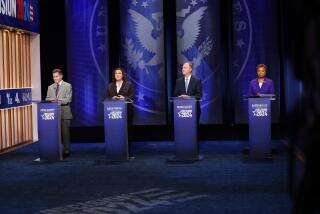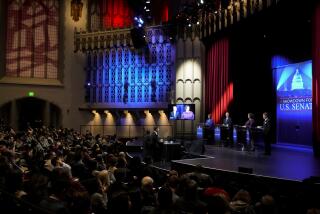Rivals Assail Gephardt’s Economic Ideas
- Share via
WILLIAMSBURG, Va. — Missouri Rep. Richard A. Gephardt came under attack from his Democratic presidential rivals at a campaign debate on economic policy here Monday night for his vote for the 1981 tax cut bill and his proposals for an oil import fee and tougher trade policy.
Tennessee Sen. Albert Gore Jr. and Massachusetts Gov. Michael S. Dukakis seemed particularly irritated that Gephardt was seeking to take advantage in the South of his support of the tax cut, which they considered the main reason for the flaws in Reagan Administration economic policy. Fourteen Southern and Border states vote in the Super Tuesday primaries next Tuesday.
“That vote and those policies created this mess,” Dukakis charged. “And you know that and I know that. I heard you apologize for that vote in Iowa.”
Clear Tax Stance Urged
“Mike, do you want to raise taxes on the average American family?” retorted Gephardt, who asserted that the Democrats could not regain the White House unless they made clear that they would not raise taxes on average taxpayers.
“I think the 1981 tax bill was a good idea,” he said, contending that most of its benefits went to those earning $50,000 a year and less.
When Gore asked him if he thought the bill was fair, Gephardt said he thought the part that cut taxes for average taxpayers was fair. Gore continued to press the point until Gephardt said: “I thought they taught you manners at St. Albans,” the private secondary school in Washington that Gore attended while his father was serving in the Senate.
Gephardt brought up his proposal to give the President authority to retaliate against unfair trade practices by foreign countries as a way to meet the problems posed by heavy foreign investment in this country, arguing that the huge trade deficit made such investments “inevitable.”
Former Colorado Sen. Gary Hart contended that Gephardt’s proposal was “desperately wrong” and would lead to more trade barriers instead of fewer.
‘Want All the Barriers Down’
“We’ve been putting up with these trade barriers for 25 years,” Gephardt said. “I just think it’s time to go to other countries and say, ‘Look, we want all the barriers down.’ ” But Dukakis argued that no new legislation was needed because the President already had the power required to deal with the problem. “We need a President who will take action under the authority you have already given him,” Dukakis said.
Dukakis charged that Gephardt’s proposal for an oil import fee would seriously hurt sales of oil from Mexico and cause a crisis in the Mexican economy. “Are you running for President of Mexico or America?” Gephardt retorted.
The candidates spent most of the 90-minute debate, televised over C-Span cable television and staged at the College of William and Mary, going over familiar terrain on such issues as the budget and trade deficits and tax policy.
But moderator Judy Woodruff broke new ground when she asked Gore why he was quicker to criticize Gephardt and Dukakis than he was the Rev. Jesse Jackson. Gore contended that one reason was that Jackson had never held public office and so had no record that could be scrutinized and attacked.
Jackson Proposal Questioned
He did point out that he had earlier in the debate questioned whether Jackson’s proposal for investing workers pension funds might not be financially prudent. The plan calls for the funds to be invested in various enterprises that would alleviate unemployment and improve conditions for impoverished Americans.
But Jackson, who has rarely been challenged by any of his opponents in debates in 1988, any more than he was during the 1984 campaign, sought to take advantage of Woodruff’s question to depict himself as an injured party.
“That’s a race-based question,” he charged. “I’m a bona fide Democrat. I have registered more Democrats than anybody on this stage. I am the reason that some of these Democrats are on this stage.”
Jackson complained that in the New Hampshire primary one network exit poll asked voters if they would vote for a black. “I asked if they asked if they would vote for a Greek,” he said, a reference to Dukakis’ ethnic origins.
‘It’s Self-Evident’
“Why make reference to my race?” he asked. “It’s self-evident. Let’s take the issues to the people.”
Illinois Sen. Paul Simon, the sixth Democratic contender, whose campaign is in serious trouble because of his failure to win any of the early delegate contests, did not appear because he was campaigning in Western states that also will ballot on March 8.
The debate night was sponsored by the Democratic Leadership Council, a group of moderate and conservative party leaders and elected officials who have sought to promote interest in the Super Tuesday primary.
More to Read
Get the L.A. Times Politics newsletter
Deeply reported insights into legislation, politics and policy from Sacramento, Washington and beyond. In your inbox twice per week.
You may occasionally receive promotional content from the Los Angeles Times.










